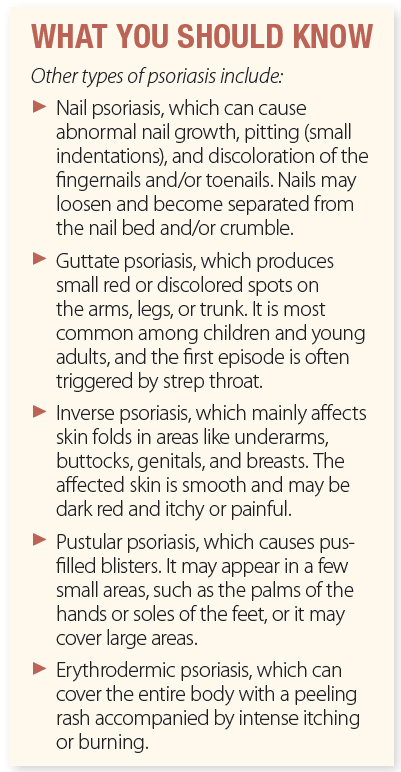Don’t Take Psoriasis Lightly: It May Affect More Than Your Skin
Having a mild case of psoriasis may be more of a bothersome annoyance than a significant problem. However, even if mild psoriasis isn’t causing major symptoms, it’s important to have it evaluated by a dermatologist, because psoriasis is linked with a higher risk of many other diseases.
“Having psoriasis increases the risk of cardiovascular disease, high blood pressure, diabetes, stroke, obesity, high lipids, anxiety, depression, inflammatory bowel disease, and lung disease,” explains Shari Lipner, MD, PhD, a dermatologist at Weill Cornell Medicine. Dr. Lipner notes that up to a third of patients with psoriasis have psoriatic arthritis, a condition that causes pain and swelling in joints and can result in permanent joint damage. She recommends that anyone who has psoriasis be evaluated for psoriatic arthritis, since earlier diagnosis and treatment of the condition reduce the risk of permanent damage and disability.
Psoriasis 101
There are several types of psoriasis, but the most common is plaque psoriasis. Among the more than 8 million Americans who have psoriasis, an estimated 80 percent have plaque psoriasis.
“Plaque psoriasis is an inflammatory skin disease that causes skin cells to form more quickly than average, resulting in scaly plaques. The plaques can affect any area of skin, but the elbows, knees, back, and scalp are the areas most commonly affected,” says Dr. Lipner.
Psoriasis often looks like a patchy rash. It’s usually itchy, but it can also be painful. Psoriatic skin can become dry, crack, and bleed. Psoriasis can interfere with sleep, increase stress levels, take a toll on your mental health, and diminish your quality of life.
The exact cause of psoriasis is unknown, but it is thought to be an autoimmune disease—a condition in which the immune system mistakenly attacks healthy tissue.
Like other autoimmune conditions, psoriasis tends to go through cycles; symptoms often flare up for a few weeks or months and then subside. Flares can be triggered by a number of things and vary from person to person. Some common triggers include stress, skin injuries (cuts, burns, bug bites), infections, and cold weather. Other suspected triggers include alcohol, certain foods and medications, allergies, and environmental factors.

Treatment Options
“Treatment options include topical medications, light therapy, oral immunosuppressive medications, and biologics. Treatments for psoriasis are individualized, so there is no ‘best’ treatment for all patients,” explains Dr. Lipner.
Topical medications are applied to the skin and are most often used to treat mild to moderate plaque psoriasis. These products come in creams, lotions, gels, ointments, sprays, and shampoos; some are available over the counter, and some require a prescription.
Light therapy involves repeatedly exposing the affected skin to light. There are several types of light therapy, many of which use ultraviolet B light. Light therapy is sometimes used in combination with medications that make the skin more responsive to the light.
Most of the medications for psoriasis that are delivered orally or via injection work by suppressing the immune system. While they are often effective at reducing symptoms of psoriasis, these drugs raise the risk of serious infections and cancer and may have other potentially serious side effects.
Oral medications include apremilast, methotrexate, and cyclosporine.
Biologics are drugs most commonly delivered via injection. They include abatacept (Orencia), adalimumab (Humira), etanercept (Enbrel), guselkumab (Tremfya), risankizumab (Skyrizi), secukinumab (Cosentyx), and ustekinumab (Stelara), among others.
If you think you have psoriasis but have never mentioned it to your dermatologist, it’s time to do so. While your psoriasis may be mild, and it may respond well to over-the-counter products, it’s smart to be evaluated by a dermatologist in case there’s more to your condition that could lead to bigger health problems down the road.
The post Don’t Take Psoriasis Lightly: It May Affect More Than Your Skin appeared first on University Health News.
Read Original Article: Don’t Take Psoriasis Lightly: It May Affect More Than Your Skin »


